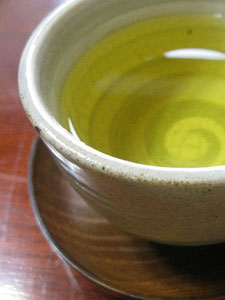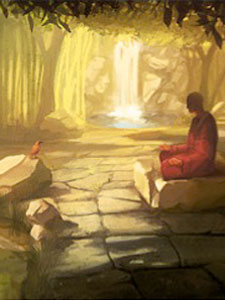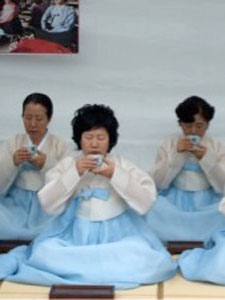The Way of Tea



There was once a famous Chinese master named Zhao Zhou. He was so famous that he had visitors all the time who would come seeking the meaning of enlightenment. One day two young seekers knocked on his door begging for words of wisdom. Zhao Zhou welcomed them into his small hut and told them to sit down at a table where an old monk was already sitting. "Please tell me the meaning of Buddha," the first student asked. Zhao Zhou replied, "Drink some tea!" The second student then asked, "What is truth?" and Zhao Zhou excitedly replied, "Drink some tea!" The old monk sitting there was quite perplexed about this interaction and wondered to himself, "Why does he tell them to both drink tea instead of answering their questions?" Zhao Zhou, being a great Zen master, read the monk's mind and said to him, "You drink tea too!"
This story symbolizes the relationship that the Chinese and Japanese spiritual traditions have with tea. As you're probably already aware, China and Japan are both tea embracing cultures. Indeed, tea is an integral part of both cultures stemming from Buddhist influence, as discussed in the previous issue Buddha's Tea. Chan Buddhism, which later evolved into Zen, has a particular affinity with tea.
One facet of Zen's style is teaching through a story or a question posed to the student, commonly referred to as a koan. The most famous koan is of course, what is the sound of one hand clapping? The answer is not as important as how you arrived at it and what you gained from it. Not every koan is a question; some just tell a short story. There is a specific purpose to each koan, a specific insight meant for dawning within the individual as they internally digest the ideas. The koan above is a famous one used in Zen; it illustrates the importance of tea and its relation to the goal of Buddhism. The insight gained from this koan shows us that the act of drinking tea is quite special and should be cherished immensely.
Today, when we think of the benefits of drinking tea, we usually think of the physiological benefits. There are of course many benefits to our bodies when we drink tea. Studies have shown that it can help prevent cancer and build immune function, but what about the psychological benefits? Remaining awake is not the particular mental benefit that I am alluding to. In the koan above, Zhao Zhou pointed out the importance of drinking tea as an act. The purpose of drinking tea is to be in the present. It is not an act of doing but rather simply being there with the tea, with the world, and experiencing life completely. It is an observable fact that we habitually live in the world of ideas instead of the present. We are constantly planning the future or remembering the past. The two seekers came to Zhao Zhou seeking more ideas, but the wise sage showed them the true meaning of Buddha by pointing them to the present moment. What better way is there to remain in the moment than to drink tea?
It might be that you drink tea while doing other things like checking your email or reading the latest issue of TeaMuse, but perhaps there is a better way. Next time you drink a cup try to remain totally present. Let any thoughts or worries that come into your mind pass by like clouds in the sky. Instead focus on the raw sensations in your experience: feel your hands holding the warm cup, smell the fragrance of the leaves, see the vivid colors in your vision, hear the sound of birds chirping or floorboards creaking, and taste the flavor of the tea. Do this slowly and be totally present. It might be difficult at first but eventually you will see that drinking tea serves an important and beneficial psychological function. The art of presence through action is exemplified by the Japanese tea ceremony, described earlier in the issue Zen & Leaves. Of course one can, and should, be totally present with any act, but picking one action allows one to focus totally on developing presence which then bleeds through to all actions.
Tea has specific symbolic qualities that relate to the view of Asian philosophical traditions. The first is simplicity. In a culture dominated by strong tastes, tea provides an opportunity to tune into more subtle flavors. Both Buddhism and Taoism stress that a life of simplicity brings great peace. Yearning for extravagance never brings satisfaction. The taste of tea is thus very special because it's not extravagant or excessive. It is beautiful in its simplicity. Many people who are addicted to strong tastes will find tea to be too boring or bitter at first. After acquiring a taste for tea, they will never again desire to drink overly sweet and artificially flavored drinks. This is symbolic of the Buddhist view on life. We desire exciting escapades and fancy cars to make life more thrilling because life seems quite boring without additions, but if we relax into a more simple life we will find great peace and happiness. Tea not only serves as a symbol for a peaceful life but the act of drinking tea can provide the means to come in contact with it.
